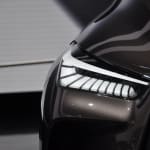
The trend toward developing complex, intricate automotive lighting designs using light-emitting diodes (LEDs) has created a need for high-performance thermoplastics with exceptional flow and easy mold release. Design elements such as part and function integration, wider, larger and thinner forward and rear lighting components, and critical aesthetics call for materials that can enable thin walls, aggressive styling with sharp draft angles and an impeccable appearance. SABIC’s portfolio of super high-flow Lexan™ polycarbonate (PC) resins for automotive lighting bezels enables the industry to create complex geometries and integrate more features never before possible with ease of manufacturing.
LEDs Illuminate New Designs
As LEDs’ performance have improved and their power consumption and cost have dropped, they have become practical for use in multiple vehicle categories. In turn, broader adoption of LEDs has helped expand freedom in lighting design. Another outcome of increased LED use can be seen in expanded material options. The lower operating temperature of LEDs compared to incandescent bulbs has allowed PC to be used extensively in automotive lighting, particularly in bezels, where it may be colored or metallized. Today, thanks to its attractive aesthetics and impact resistance, PC is the most commonly used thermoplastic for bezels.
“The capabilities of LEDs have helped lighting become one of the primary differentiators for today’s cars and trucks,” said Sergi Monros, vice president of SABIC’s Performance Polymers & Industry Solutions business group. “To take full advantage of the complex designs made possible with LEDs, lighting manufacturers need breakthrough materials. Our portfolio of high-flow Lexan resins combines greater design freedom with expanded processing flexibility so customers can create stunning yet easily manufactured lighting components.”
Highest Flow, Easy Mold Release
Among SABIC’s PC resins for automotive lighting, Lexan HF4010SR resin features the highest flow, as measured by melt volume rate (MVR) testing. Super high flow not only enables automotive OEMs and tier suppliers to develop complex headlight bezels with enhanced aesthetics, it also reduces the amount of clamping force required for tooling. This offers the possibility to use existing injection molding machines for more-complex designs that normally would require a higher clamping force.
Industrias Arteb SA, a Brazilian lighting manufacturer, recently benefited from this option when employing high-flow Lexan HF4010SR resin for the front bezel of a new compact sport utility vehicle. The SABIC material, which can be processed using a lower clamping force and injection pressure than lower-flow PC resins, enabled Arteb to reduce development costs by using its existing machine for this thinner bezel.
“Using standard equipment to mold a bezel with a significantly thinner profile and more-complex design helped Arteb avoid capital costs while delivering exactly what the OEM required,” said Jarbas Enzenberg, Engineering and Quality director, Arteb. “In addition to the performance of high-flow Lexan resin, an important success factor for this project was the expert assistance that was provided by SABIC’s technical team. We look forward to collaborating with SABIC in the future on the development of new applications.”
SABIC’s Lexan HF4010SR resin also provides a solution to the industry challenge of poor mold release for PC parts with low draft angles. These angles can cause the part to stick in the mold or develop scuff marks when released from the mold, leading to rejects. The easy release properties of this resin enable faster de-molding and the reduction of surface defects, even in parts with challenging release angles (0.5 to 1.0 degrees lower than the recommended PC draft angle) and thin walls. As a further manufacturing enhancement, Lexan HF4010SR resin features a wide processing window.
Lexan HF4010SR resin complements SABIC’s larger high-flow thermoplastics portfolio with grades such as Lexan HF1110R resin and Lexan HF3510R resin. These additional grades can deliver similar benefits as Lexan HF4010SR resin; however, they have different property profiles and can exhibit lower impact and chemical resistance. SABIC specialists can help determine the material grade that can best meet application performance requirements.



